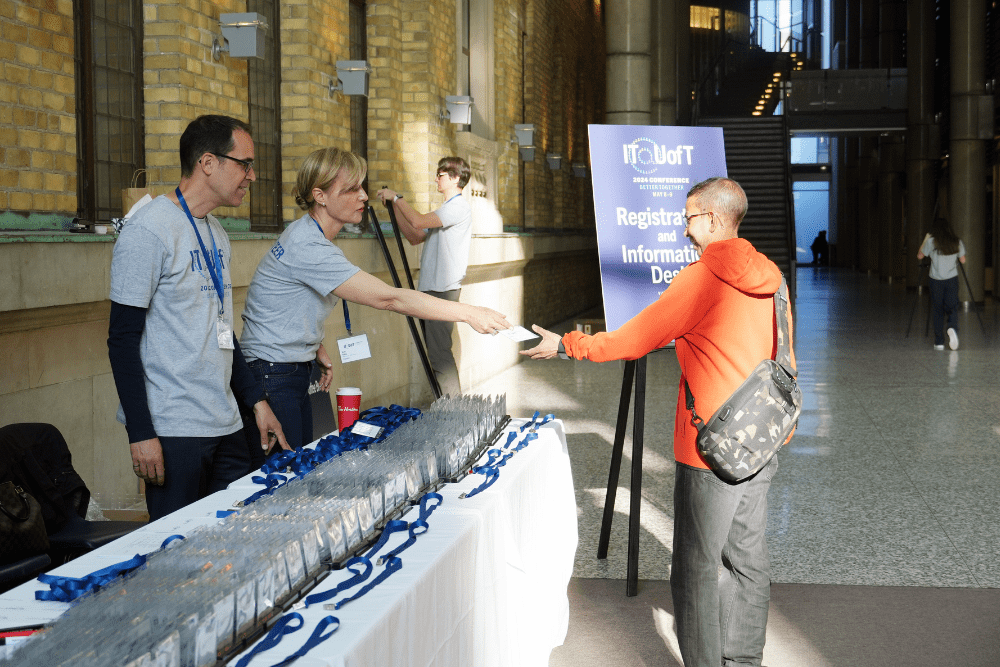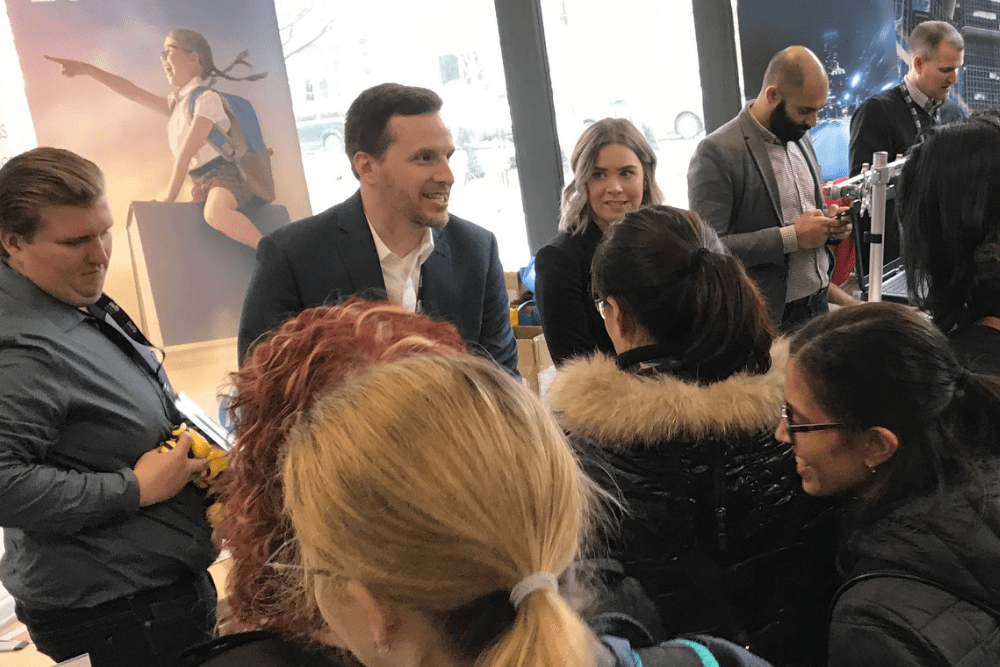The IT@UofT 2025 conference will offer many opportunities to learn and network with the tri-campus IT@UofT community, including keynote presentations, breakout sessions and more.
IT@UofT 2025 information desk
If you have questions during the conference, visit the information desk to speak with our volunteers and conference organizers.


Sponsor expo
Visit our sponsors to learn about their latest products.
May 6, 2025
Time
Location
Activity
7:30 – 10:30 a.m.
Bahen Centre for Information Technology, Atrium
Registration
8:45 – 8:50 a.m.
Convocation Hall
Opening remarks from IT@UofT co-chair Professor Susan McCahan, Associate Vice-President and Vice-Provost, Digital Strategies and Vice-Provost, Innovations in Undergraduate Education
8:50 – 9 a.m.
Convocation Hall
Remarks from Scott Mabury, Vice-President, Operations and Real Estate Partnerships & Vice-Provost, Academic Operations
9 – 9:05 a.m.
Convocation Hall
Welcome from IT@UofT co-chair Dr. Donna K. Kidwell, CIO, ITS
9:05 – 10:05 a.m.
Convocation Hall
Keynote: AI for everyone: Rethinking inclusion in the age of intelligent technology
Beth Rudden, CEO and Chairwoman of Bast AI
10:05 – 10:25 a.m.
Bahen Centre for Information Technology, Atrium
Refreshment break
10:25 – 11:15 a.m.
Breakout session block 1
Bahen Centre for Information Technology, Room 1170
- Deyves Fonseca, Acting Chief Information Security Officer
- Akshat Mishra, Information Security Program Manager, Information & Instructional Technology Services (I&ITS), University of Toronto Mississauga (UTM)
Bahen Centre for Information Technology, Room 1200
- Shawn Winnington-Ball, Manager, Information System Security, SciNet, Division of the Vice-President, Research & Innovation (VPRI)
- Yohai Meiron, Scientific Applications Analyst, SciNet, VPRI
Bahen Centre for Information Technology, Room 1240
Speaker: Stephen Marks, Digital Preservation Librarian, University of Toronto Libraries (UTL)
Myhal Centre for Engineering Innovation and Entrepreneurship, Room 330
- Esther Simmonds-MacAdam, Service Management Program Lead, Enterprise Infrastructure Solutions (EIS), Information Technology Services (ITS), St. George
- Vince Borghese, Manager, Client Success and Service Delivery, EIS, ITS, St. George
Myhal Centre for Engineering Innovation and Entrepreneurship, Room 360
- HY Luo, Product Delivery Lead, Information & Instructional Technology Services (I&ITS), University of Toronto Mississauga (UTM)
- Dennis Perkovic, Digital Workplace Specialist, I&ITS, UTM
11:15 – 11:20 a.m.
Bahen Centre for Information Technology, Atrium / Myhal Centre for Engineering Innovation and Entrepreneurship
Break
11:20 a.m. – 12:10 p.m.
Breakout session block 2
Bahen Centre for Information Technology, Room 1160
- Avi Hyman, Director, Academic, Research & Collaborative (ARC) Technologies, Information Technology Services (ITS), St. George
- Jianheng Chen, ARC Analyst (Practicum) and Master of Information Candidate
- Haoyu Tan, ARC Analyst (Practicum) and Master of Information Candidate
Bahen Centre for Information Technology, Room 1170
- Michael Laurentius, Research Information Security Specialist, Information Security, Information Technology Services (ITS), St. George
- Carl Chan, Manager, Visibility and Infrastructure, Information Security, ITS
- Ashley Langille, Business & Privacy Analyst, Information Security, ITS
Bahen Centre for Information Technology, Room 1200
- Chris Klammer, Technology Adoption Consultant (Systems/Data Integration), Education Commons, Ontario Institute for Studies in Education (OISE)
- Josie Lalonde, Director, Student Experience, Registrar’s Office and Student Experience, OISE
Bahen Centre for Information Technology, Room 1210
- Theingi Zaw, Web Developer, UTM Library
- Michael Serafin, Librarian, UTM Library
- Yuening Chen, Student Employee, UTM Library
Bahen Centre for Information Technology, Room 1240
Speaker: Donny Wong, Teaching Applications Technical Lead, Department of Computer Science
Myhal Centre for Engineering Innovation and Entrepreneurship, Room 360
Speaker: Kelli Conlin, Consulting Engineer, Apple
This session is brought to you by Apple, a gigabyte sponsor.
12:10 – 1:10 p.m.
Myhal Centre for Engineering Innovation & Entrepreneurship, Lobby and Lee & Margaret Lau Auditorium (Myhal 150)
Lunch
1:10 – 2 p.m.
Breakout session block 3
Bahen Centre for Information Technology, Room 1160
- Andrew Arifuzzaman, Chief Administrative Officer (CAO), Office of Business, Operations and Strategic Affairs, University of Toronto Scarborough (UTSC)
- Zoran Piljevic, Senior Director, Technology and Business Transformation, UTSC
- Maya Churbaji, CAO, Leslie Dan Faculty of Pharmacy
- Sebastian Bisciglia, Director, Information and Learning Technology, Faculty of Music
- Gina John, CAO, Faculty of Law
- Adrian Balaura, Director, Technology Services, Faculty of Law
- Kiren Handa, Executive Director, Institutional Research & Data Governance
- Kalyani Khati, Associate Director, Information Security Strategic Initiatives, Information Technology Services (ITS), St. George
- Kanupriya Kejriwal, Manager, Information Security Risk, ITS
Bahen Centre for Information Technology, Room 1200
Speaker: Jose Manuel Lopez Lujan, Manager, Servers, Storage & Virtualization, Enterprise Infrastructure Solutions (EIS), Information Technology Services (ITS), St. George
Bahen Centre for Information Technology, Room 1210
Speaker: Akshat Mishra, Information Security Program Manager, Information & Instructional Technology Services (I&ITS), University of Toronto Mississauga (UTM)
Bahen Centre for Information Technology, Room 1240
- Belinda McKay, Executive Assistant, Information Security, Information Technology Services (ITS), St. George
- Kristine Antony, Junior Business Analyst, Information Security, ITS
Myhal Centre for Engineering Innovation and Entrepreneurship, Room 360
Speaker: Pete St. Onge, Manager, Security Services, Information Security, Information Technology Services (ITS), St. George
2 – 2:05 p.m.
Bahen Centre for Information Technology, Atrium / Myhal Centre for Engineering Innovation and Entrepreneurship
Break
2:05 – 2:55 p.m.
Breakout session block 4
Bahen Centre for Information Technology, Room 1160
- Heidi Bohaker, Professor, Department of History
- LK Bertram, Associate Professor, Department of History
- Dr. Donna K. Kidwell, Chief Information Officer
Bahen Centre for Information Technology, Room 1200
- Andrew Buckles, Executive Vice President, Cyber Services, ISA Cybersecurity
- Deyves Fonseca, Acting Chief Information Security Officer, University of Toronto
- Matthew Balcer, Director, Solutions Engineering, SentinelOne
This session is brought to you by ISA Cybersecurity and SentinelOne, two of our gigabyte sponsors.
Bahen Centre for Information Technology, Room 1210
- Javier Ramirez Martinez, Enterprise Virtualization & Storage Specialist, Enterprise Infrastructure Solutions (EIS), Information Technology Services (ITS), St. George
- JM Lopez, Manager Enterprise Virtualization & Storage Specialist, EIS, ITS
Bahen Centre for Information Technology, Room 1240
- Bahman Yaghoobi, Full-Stack Developer, Education Commons, Ontario Institute for Studies in Education (OISE)
- Thomas Lynch, Full-Stack Developer, Education Commons, OISE
Myhal Centre for Engineering Innovation and Entrepreneurship, Room 330
- Blake Markle, Manager – Classroom Technology and Film Services, Information & Instructional Technology Services (IITS), University of Toronto Scarborough (UTSC)
- Tanisha Dave, Project Manager, UTSC
- Glenn Attwood, Senior Manager, Networking and Telecommunications, IITS, UTSC
2:55 – 3:15 p.m.
Bahen Centre for Information Technology, Atrium
Refreshment break
3:15 – 4:05 p.m.
Breakout session block 5
Bahen Centre for Information Technology, Room 1160
- Frank Boshoff, Assistant Director, Technical Solutions & Architecture, Enterprise Applications & Solutions Integration (EASI), Information Technology Services (ITS), St. George
- Andre Kalamandeen, Manager, Data, Architecture & Integration, EASI, ITS
Bahen Centre for Information Technology, Room 1200
Speaker: Marlene van Ballegooie, Metadata Technologies Manager, University of Toronto Libraries (UTL)
Bahen Centre for Information Technology, Room 1210
Speaker: John DiMarco, IT Director, Department of Computer Science
Myhal Centre for Engineering Innovation and Entrepreneurship, Room 330
- Sam Xu, Developer, MedIT, Temerty Faculty of Medicine
- Maurice Tam, Developer, MedIT, Temerty Faculty of Medicine
Myhal Centre for Engineering Innovation and Entrepreneurship, Room 360
Speaker: Cory Travers Lewis, Assistant Professor (Teaching Stream), Institute for the History & Philosophy of Science & Technology
4:05 – 4:10 p.m.
Bahen Centre for Information Technology, Atrium / Myhal Centre for Engineering Innovation and Entrepreneurship
Break
4:10 – 5 p.m.
Breakout session block 6
Bahen Centre for Information Technology, Room 1160
- Annie Hua, Manager, Research & Collaborative Applications, Academic & Research Collaborative (ARC) Technologies, Information Technology Services (ITS), St. George
- Jordan Holmes, Senior Manager, Teaching & Learning Technologies, Centre for Teaching Support & Innovation (CTSI)
- Cordelia Shan, Information Systems Analyst, ARC, ITS
- Victoria Sheldon, Faculty Liaison Coordinator, CTSI
Bahen Centre for Information Technology, Room 1200
- Carl Chan, Manager Visibility and Infrastructure Security, Information Security, Information Technology Services (ITS), St. George
- Matt Norrie, Detection Engineer, Information Security, ITS
Bahen Centre for Information Technology, Room 1210
Speaker: Rob Huang, Educational Developer, Robert Gillespie Academic Skills Centre (RGASC), Institute for the Study of University Pedagogy (ISUP), University of Toronto Mississauga (UTM)
Myhal Centre for Engineering Innovation and Entrepreneurship, Room 330
Speaker: Chris Sabatinos, Web Accessibility Specialist, Accessibility for Ontarians with Disabilities Act (AODA) Office, Division of People Strategy, Equity and Culture
Myhal Centre for Engineering Innovation and Entrepreneurship, Room 360
Speaker: Otto Yung, Associate Professor (Teaching Stream), Department of Management/Institute for Management & Innovation, University of Toronto Mississauga (UTM)
Please note that the schedule is subject to change.
